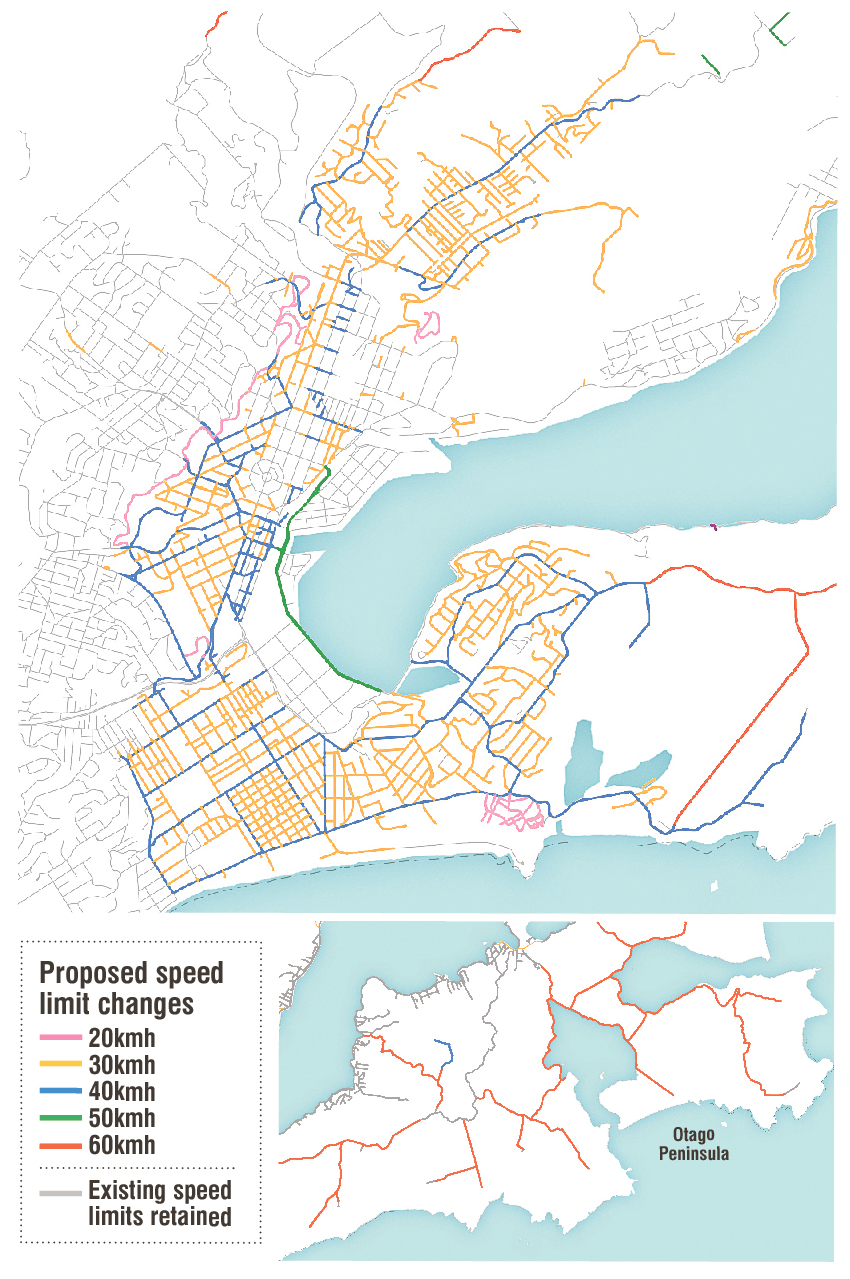
It is proposed sizable parts of the city will be covered by 30kmh limits, a series of arterial routes could have 40kmh limits and rural roads will be subject to blanket traffic speed reductions.
All rural roads that are the responsibility of the Dunedin City Council and which have 100kmh limits could be reduced to 80kmh limits or, if they are unsealed, 60kmh.
Proposed changes are outlined in a draft speed management plan for 2024-27, to be discussed by the city council next week and put forward for public consultation next month and a public hearing in October.
They were developed "in accordance with the guidance and recommendations" set out in Waka Kotahi NZ Transport Agency’s Road to Zero programme, a report for the council said.
State highways are not subject to the council’s decision-making and Waka Kotahi is to run its own consultation about those next year.
Hearings panel chairman Cr Jim O’Malley said the council was required to develop a speed management plan in accordance with the transport agency’s rules.
"This means it is important to hear from residents so that the hearings panel will be able to consider community feedback in addition to Waka Kotahi guidelines, and what benefits these proposed speed limit changes will bring to Dunedin," he said.
Many of the proposed changes within Dunedin apply to an area spanning the North East Valley to Vauxhall on Otago Peninsula and taking in City Rise, South Dunedin and St Kilda.
Most streets in such areas could have speed limits reduced from 50kmh to 30kmh and it is proposed some arterial roads will have 40kmh limits.
It is proposed Queens Dr, which runs through the Town Belt, will be 20kmh.
Port Chalmers, Middlemarch, Outram, Karitane, Waikouaiti and Waitati could all have 30kmh limits brought in.
Mosgiel is one area set to have its limits reviewed in 2027-30.
Concerning rural roads, the council said in the speed management plan draft it was taking a "whole-of-network approach to ensure there is no doubt over what the underlying speed limit is on non-urban roads".
The council said it was working with neighbouring district councils to promote consistency and with the transport agency to "align new safer speed limits for local roads and highways".
AA Otago chairman Malcolm Budd said the organisation supported reduced speed limits around schools, particularly variable limits, but he took issue with a blanket approach to reductions.
Reductions should be justified on a case-by-case basis, Mr Budd said.
Sweeping reductions on rural open roads would be "ridiculous", causing frustration for motorists and leading to some taking more risks with overtaking, he said.
Slowing down traffic might also increase carbon emissions, Mr Budd said.
The council’s draft plan said higher-speed crashes were more likely to result in fatalities or serious injuries.
"At the heart of speed management is constraining higher vehicle speeds."
The council signalled some roading design changes might be needed, although this would often not be needed where streets were narrow or winding.
"To achieve lower speeds in urban centres, it may be necessary to implement a lower speed limit in conjunction with redesign of parts of the roading environment.
"Lower design speeds will typically need to be achieved through traffic-calming measures, urban design and amenity features, and improved provision for pedestrians, cyclists and mobility-impaired users."
The council said in creating the proposal it had been conscious speed limits were "for all road users" — this included "local drivers and everyone they share the road with: infrequent drivers, tourists, pedestrians and cyclists who should all feel safe".
"The highest concentration of vulnerable user activity occurs in urban centres and traffic speeds should be managed in a manner appropriate for the mix of uses and activities that take place there."
Hitting the brakes
Dunedin urban centres with proposed speed limit reductions are: Andersons Bay, Burkes, City Rise, Dalmore, Dunedin Central, Kensington, Liberton, Musselburgh, Normanby, North Dunedin, North East Valley, Ocean Grove/Tomahawk, Opoho, Pine Hill, Port Chalmers, Portobello, Roseneath, St Clair, St Kilda, Sawyers Bay, Shiel Hill, South Dunedin, Tainui, Vauxhall, Waverley.












